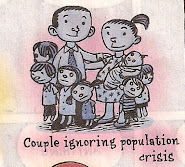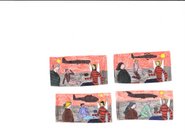by John C. Wright
I used to have a link to this article on my iPhone.
One day, the link went ‘cold,’ with only an apology from the folks at the ‘Dappled Things’ website in its place. I searched in vain for the article. This evening, while talking to one of our children, I realized that most of the points I was trying to make were modeled after this talk. It seemed that I should really try once again to find this article for my children’s sake as well as for my own edification. It didn't take long to find when I used my desktop Apple rather than my iPhone.
I once read that the best thing one could do for a budding writer is to buy him a thesaurus, and then shoot him in the head, because that would be the last time he would ever be happy. I suffer with delusions that I could be a good writer if I only put in enough time and practice. Thanks be to God, I have a large family and a good job which keeps me too busy to pursue this full time. So when I do get a chance to write - like now - it is late at night and I am more inclined to sleep. Still, I submit this article for those who aspire to write, or for those who are finding it difficult to find a job and need a little encouragement.
One day, the link went ‘cold,’ with only an apology from the folks at the ‘Dappled Things’ website in its place. I searched in vain for the article. This evening, while talking to one of our children, I realized that most of the points I was trying to make were modeled after this talk. It seemed that I should really try once again to find this article for my children’s sake as well as for my own edification. It didn't take long to find when I used my desktop Apple rather than my iPhone.
I once read that the best thing one could do for a budding writer is to buy him a thesaurus, and then shoot him in the head, because that would be the last time he would ever be happy. I suffer with delusions that I could be a good writer if I only put in enough time and practice. Thanks be to God, I have a large family and a good job which keeps me too busy to pursue this full time. So when I do get a chance to write - like now - it is late at night and I am more inclined to sleep. Still, I submit this article for those who aspire to write, or for those who are finding it difficult to find a job and need a little encouragement.
I also am putting it on my blog so I don’t lose it again.....
First, the credits. The author is described as
“a retired attorney, newspaperman and newspaper editor, who was only once on the lam and forced to hide from the police who did not admire his newspaper. He presently works (successfully) as a writer in Virginia, where he lives in fairy-talelike happiness with his wife, the authoress L. Jagi Lamplighter, and their three children: Orville, Wilbur, and Just Wright.”
“Only once on the lam.” Why only once? Should there have been other times? Hmmmmm.
The link to this article can be found at this link.
So here goes......
John C. Wright's patented and guaranteed Ten Commandments for How to be a Writer.
1. In order to be a writer, you must write.2. In order to write, you must use proper spelling, punctuation, grammar; or, if you violate these rules, the violation must be deliberate, to create an artistic effect. Avoid politically correct jargon at all costs. Do not use ugly constructions like "he or she"; it will date your work, and the cool people will laugh at you.
3. In order to be a writer, you must sell what you write. No manuscript should spend a single night on your desk; the same day you get a rejection, put the manuscript in the mail to the next editor. Let the manuscripts spend their nights on the editor's desk.
4. In order to sell what you write, read the editor's guidelines for his magazine or publishing house and follow them. These guidelines are available in a reference book called Writer's Market. Get the reference book for the current year. If the guidelines say double-spaced white paper single sided, and no samurai vampire stories, do not send him "Lightning Swords of the Nosferatu of Kyoto" printed on blood-red paper, single-spaced, double sided. Failure to follow the guidelines shows you are a dude, a tenderfoot, a punk, a novice, not someone meant to be treated with professional courtesy. Your story is your child: no mother would send her child out to look for a job without fixing his tie and shining his shoes.
5. Include a self-addressed stamped envelope with proper postage affixed, if you want the manuscript back.
6. You will receive on average ONE HUNDRED rejection slips before you make your first sale. This is an average. This means that if someone, say, Lester del Rey, makes his first sale on his first attempt without getting a rejection, that someone else, say, Ray Bradbury, will get two hundred rejection slips.
7. If your manuscript is good or bad, send out your manuscript again. Genius does not count. Only persistence counts. The world will not recognize your genius until after you are dead. But the world can recognize your persistence now.
8. If the manuscript is good, send out your manuscript again. The editor who rejected it last month or last year may have different needs or a different budget this month or this year.
9. If the manuscript is bad, send out your manuscript again. The worst thing you ever wrote will someday, somehow, be some schoolboy's favorite story ever. Your readers are your employers. Respect and fear them. Do not approach this work with pride or selfishness or any of the other emotions to which men of fragile artistic spirits are inclined. It is a profession. Act professionally.
10. Selling writing means your manuscripts go out, and money comes back in. Money always goes toward the writer. Money never goes away from the writer. This means you do not hire a manuscript doctor, you do not pay a reading fee, you do not enter a contest which charges an entry fee. Those are scams. Agents are paid on commission, paid when and only when they sell your wares, whereupon the money comes from the publisher and goes toward you; You do not pay the agent a retainer.
To sum up: To be a writer, you write. You write by writing grammatically correct English, not Politically Correct Newspeak. You sell what you write. You sell what you write by following the editor's submission guidelines. You include a self-addressed stamped envelope. You continue to submit stories whether they are good, bad or mediocre. You treat it like a job.
Do not wait to be inspired. So-called inspiration consists of sitting down at scheduled times for scheduled amounts of time and actually doing the work of writing. It is the same inspiration used by a cobbler to make a shoe, or a carpenter to make a chair.
Writing is not accomplished by inspiration. It is accomplished by not making excuses to not accomplish it.
Let me add one more rule to my list of ten rules. This is the Eleventh Commandment, the unwritten rule:
11. When you get a rejection slip, be thankful.
Yes, you heard me. Not only are you NOT to take it personally, you are to have thanks and gratitude in your heart for getting rejected.
Rejection slips come in three grades: (1) impersonal form letters (2) form letters with specific reasons for rejection (3) personal notes from the editor explaining the rejection.
You are to be thankful for getting an impersonal form letter because it means one more rejection slip of the one hundred or two hundred you must collect before you make your first sale has been checked off. This means that your manuscript, which has been sitting on his desk for seven months, is now free to be submitted to another editor, perhaps even to that one special editor which God or Fate or Blind Chance or the Seldon Plan of History (take your pick) had intended from the first to be the place where your manuscript would find its home. It means a fresh chance, another turn of the Wheel of Fortune.
You are to be thankful for getting form letters with specific rejection reasons because you can use this information to improve the story or improve your sales pitch, and because there is no other place in the universe you can get this information.
You are to be thankful for personal notes from the editor explaining the rejection, because this means you have graduated to the rank of being a real writer, even if you have yet to sell a single word of your art, because editors do not take the time to explain themselves to rank amateurs. It means you are good enough to make the sale, and you just so happen not to have made it this time. It is encouragement.
The main reason why you are to be thankful and grateful for rejection slips rather than bitter and insulted is that professionals are thankful. Above all, you are thankful Fate has allowed you even a slender chance at entering a profession made of wonder. You get to write down daydreams and people pay you money for it. A few blows to the ego are a small price to pay, and are probably good for improving your character anyway.
Does anyone know what the Seldon Plan of History is? Has anyone else out there read the book which describes it? All you geeks out there are nodding your heads.



















4 comments:
It's from Asimov, the Foundation series.
Thank you, Milehimama, for providing the answer. I like your new blog/website. God bless.
One thing, though. I noticed you have several posts on soup. Do you have any low-sodium soup recipes? I have to watch the salt intake........
Hi dadwithnoisykids- Most of my soup recipes are homemade, with s&p to taste. So you could easily reduce the salt or subtitutes potassium chloride, instead!
I was on my Kindle last night and it's hard to comment, so here is some more about the Seldon Plan, if you are interested.
The "Foundation" series is an epic sci-fi classic, that takes place in the future. There's a new branch of science called psihistory (psychohistory, mixing statistics, history, psychology) and the learned masters (one of whom is named Seldon) have discovered that even though humanity SHOULD go through 10,000 years of chaos, destruction, and a new Dark Age, they can shorten that duration to 1000 years with the Seldon Plan. The Seldon Plan assures a golden age (it's mathematically proven!) if everyone will just follow the plan. So, some Foundations (see title) are set up to implement it, but they are super secretive, controlling, and ultra powerful who manipulate politics, situations, people, and power. (Plot spoiler... of course, then an element from outside the galaxy shows up, this being scifi, and the Seldon Plan doesn't account for this variable. Much drama ensues.)
So here I am replying to this conversation more than 13 years after it started. I was printing this article for my youngest son who has an interest in writing when I saw your comment. At some point I read Asimov’s Foundation Trilogy. I liked it. It seemed that whatever was the solution to a problem in one chapter was the problem in the next. God bless you and yours.
Post a Comment